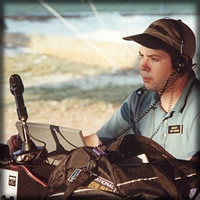Wanna be a ham?
The North Fulton Amateur Radio League is ready to help you become an amateur radio operator.
- Our Mentors can outline a self study course.
- Our Volunteer Examiners can administer your license test at one of our monthly test sessions.
- We can advise you on equipment purchases.
- Our club meetings and activities provide opportunities to visit with and learn from active hams who live in the North Fulton area.
- Our HamCram sessions are designed to prepare you to pass the technicians license exam. The session lasts one day and the technicians license exam is administered by our volunteer examiners at the end of the day. Check here to see if we currently have a HamCram class scheduled.
- We can mentor you through our self-paced Technician Exam Study course.
In addition to periodic HamCram sessions, NFARL now offers a self-paced approach to studying for your Technician class license.
There are four parts to getting
your license but the key is to let us help by assigning a mentor (Elmer) from our
club to guide you in your study. You proceed at your own pace - getting a license
in 4 weeks to 4 months - it's up to you. To view how this works, click here. It will
take about 10 hours or study - more or less. Good luck. Questions? elmer@nfarl.org

- Click here to go to our Contact Us web page where you can send us an email. In the email, tell us about yourself and the facet of ham radio that interests you most.
- Review "Tips for Prospective Hams"
- Explore the web sites mentioned at the bottom of the page
- Come to NFARL club meetings and activities
- Link up with a Mentor, find out when the next HamCram or license exam session will be held, and start studying!
- Morse code testing is no longer required, so entry level licensing is easy
- Usually no more than a week or two of study
- Study on your own and take the licensing test
at one of our monthly license testing sessions or sign up for our next HamCram session.
While you are getting started, if you have a radio or scanner:
- Listen to our club repeater (147.06 MHz)
- Monitor a repeater during bad weather. Try 146.82 MHz, a Skywarn linked repeater. (For information on Skywarn, go to http://www.skywarn.org)
Odds are there's a ham operator in your neighborhood who would be happy to help you get started. Here's a web page that shows a map of ham operators in your zip code. Click on "N4MC's Ham Locator" on the left side of the screen.
What does it cost?
- About $40 in books and fees
- About $200 for first radio and other gear
- Used equipment is available
Where can I find more information about ham radio?
- Wikipedia on Amateur Radio — a quick overview
- www.arrl.org – the national club — a great resource
— covers all aspects of our hobby
- www.eHam.net - New Ham page — Guide to Amateur Radio for New Hams. The site also has helpful forums covering equipment and ham activities, and sample license tests.
- FCC | Public Safety and Homeland Security Service Bureau | Amateur Radio Services
The FCC established amateur radio as a voluntary, non-commercial, radio communications service. It allows licensed operators to improve their communications and technical skills, while providing the nation with a pool of trained radio operators and technicians who can provide essential communications during emergencies. ... more
- Ham radio in the 21st century
Ham radio today differs greatly from that of past years, but it still offers a fascinating way to explore electronics. Here’s a look at how it has changed and what it has to offer both old hands and newcomers alike. more ...
Updated 3/19/2019 by Jim W4QO

